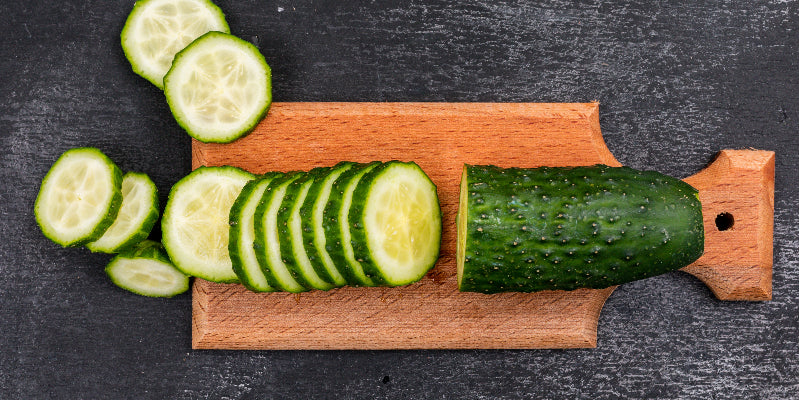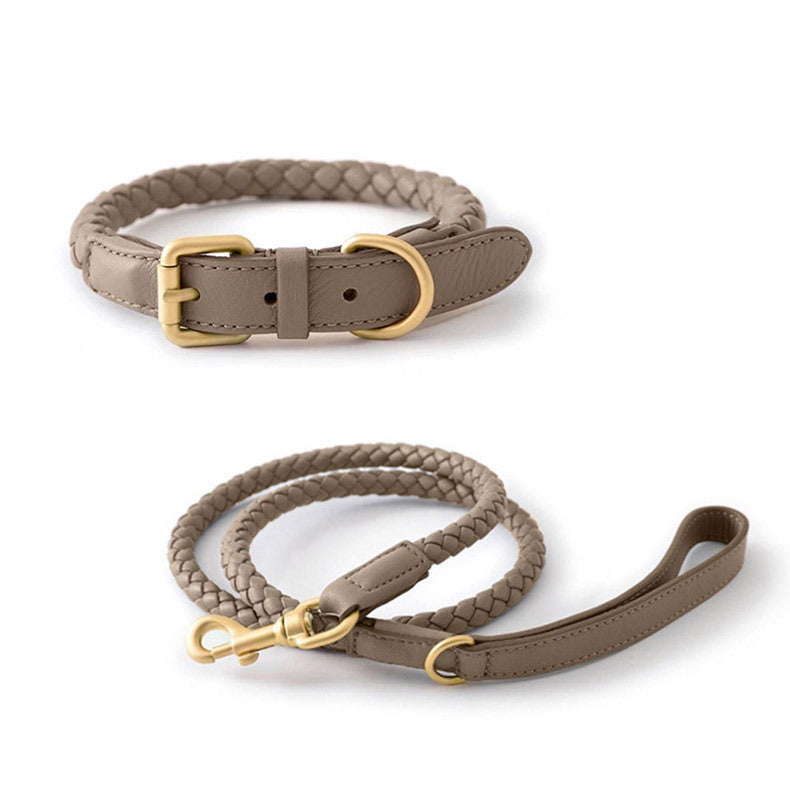
Can Dogs Eat Cucumbers
Share
On a scorching summer day, you slice crisp cucumbers to cool off. Your eager dog watches closely, nose twitching and tail wagging as if begging: "Can I try some?" The hydrating crunch seems harmless enough to share. But can dogs eat cucumbers safely? Is this common vegetable truly a risk-free dog snack?
Choosing healthy treats for dogs matters to every responsible owner. We seek low-calorie dog snacks that delight pets while providing them with essential nutrition. Cucumbers – with their high moisture content, satisfying crunch, and minimal calories – appear ideal. Yet before offering a cucumber to your dog, critical questions remain: Is a cucumber safe for dogs? Does it truly meet a dog's digestive and dietary needs?
The main components of cucumbers
Before examining can dogs eat cucumbers, we must decode this green melon's composition. Behind its hydrating properties and health benefits for dogs lies synergistic components: water content, essential vitamins, key minerals, dietary fiber, and bioactive compounds. Understanding these cucumber nutrients enables scientific assessment of their impact on canine digestion and health.
Component Analysis Optimization
Moisture Content (~95%)
The core component providing cucumber hydration benefits, making it a natural water replenishment source for dogs.
Vitamins in Cucumbers
Contains vitamin K (blood clotting support), vitamin C (antioxidant), B-complex vitamins (B5/B7), and trace vitamins A/E - concentrated in the peel.
Mineral Composition
Primarily potassium (147mg/100g) for electrolyte balance, with magnesium, manganese, copper, and silicon supporting bone health and metabolism.
Dietary Fiber Content
Both soluble/insoluble fibers (0.5g/100g) in peel and seeds, aiding dog digestive health through intestinal motility.
Plant Bioactives
- Cucurbitacin C: Anti-inflammatory compound (highest in stem area)
- Flavonoids (e.g., luteolin): Antioxidant protection
- Tannins: Source of mild astringency
Low-Calorie Nutrition,only 15kcal/100g containing:
- Carbohydrates: 2.9g (primarily fructose)
- Protein: 0.7g
- Fat: <0.2g
Digestive Enzymes
Contains proteases for protein breakdown - note heat sensitivity during cooking.
Although cucumbers are rich in water and nutrients, some of their components have special effects on the physiology of dogs. The metabolic system of dogs is significantly different from that of humans, and certain substances may pose health risks under specific conditions. A scientific understanding of these key components is the prerequisite for safe feeding.
Itemized explanation of components that have an impact on dogs.
Cucurbitacin C
At high concentrations, it is slightly toxic (especially at the pedicle). Excessive intake can irritate the dog's gastrointestinal tract, causing vomiting or diarrhea. Bitter cucumbers should be discarded.
Dietary Fiber
Although it helps intestinal peristalsis, excessive fiber (especially melon rind and seeds) can easily cause indigestion. Small dogs may experience bloating and increased flatulence.
Fructose
As the main carbohydrate, a small amount is safe; However, dogs with highly sensitive constitutions or excessive consumption may experience temporary loose stools.
Peel Contaminants
Pesticide residues and artificial waxy substances on the epidermis may cause cumulative poisoning of chemical substances. It is essential to thoroughly clean or remove the skin.
Tannins
It gives a slightly astringent taste. Sensitive dogs may refuse to eat due to taste rejection, but there is no direct health risk.
The beneficial components in cucumbers for dogs
However, cucumbers also contain various nutrients that are friendly to dogs. Under the premise of scientific feeding, they can become a health-enhancing formula. Its hypoallergenic property and high moisture content perfectly meet the physiological needs of dogs, making it especially suitable as a functional snack in summer. The key lies in precisely utilizing its core beneficial components and avoiding potential risks.
A detailed explanation of the ingredients beneficial to dogs.
High-purity moisture (Proportion 95%)
Quickly replenish lost body fluids, containing 96ml of water and 147mg of potassium per 100g, prevent heatstroke and dehydration, and regulate electrolyte balance.
Soluble dietary fiber (about 0.3g per 100g)
It gently promotes intestinal peristalsis, improves constipation problems, and is less likely to cause flatulence (compared with bean fiber).
Vitamin K (about 16μg per 100g)
It assists in the synthesis of coagulation factors, reduces the risk of traumatic bleeding, and is particularly beneficial for the vascular health of elderly dogs.
Silicon element (unique to melon flesh)
Promote the generation of connective tissue, enhance the elasticity of articular cartilage, and delay the degeneration of bone and joint in large dogs.
Cucurbitacin C (in trace amounts before bitter dissolution)
Low doses have natural anti-inflammatory effects and can inhibit skin allergic reactions (dosage must be strictly controlled to prevent toxicity).
Low-calorie carbohydrates (mainly fructose)
It provides immediate energy without any burden, with only 1/10 of dog food calories. It is an ideal snack alternative for overweight dogs.
can dogs eat cucumbers
Safety Conclusion
Yes, dogs can eat cucumbers with proper feeding guidelines. This non-toxic vegetable for dogs offers high hydration (95% water) and low calories (15kcal/100g), making it an ideal summer snack for pets. Per ASPCA's dog-safe vegetables list, cucumbers are approved when these conditions are met:
- Thorough removal of stems/rinds prevents cucurbitacin C and pesticide exposure.
- Strict portion control,<10g/kg body weight ≈ 1-2 thin slices for medium dogs.
- Avoidance for sensitive dogs, gastrointestinal issues/diabetes require veterinary consultation.
Core Health Benefits
Hydration & Thermoregulation
Each 100g provides 96ml water for dogs + 147mg potassium for rapid electrolyte balance, effectively preventing canine heatstroke.
Weight Management Snack
With just 10% of dog food calories, its fiber aids healthy dog digestion – perfect for obese dog diets replacing high-calorie treats.
Micronutrient Support
Contains vitamin K for blood clotting and joint-supporting silicon (requires consistent intake for cartilage benefits).
Practical Feeding Uses
Ideal as: dog training treats, post-surgery soft food, or appetite stimulant for picky eaters.
Risks and Taboos
Toxicity Hazard
Bitter cucumbers contain dangerous cucurbitacin C – just 5mg/kg causes vomiting (half a bitter gourd endangers small breeds). Discard immediately if bitter.
Digestive Challenges
Fructose-fiber combination may cause loose stools (avoid for puppies <6 months)
Choking prevention: Always serve diced/sliced – never whole
Nutritional Limitations
Lacks essential dog nutrients: animal protein, fatty acids, and vitamin D. Never substitute for complete meals to prevent dog malnutrition.
Conclusion
Cucumbers can serve as a safe vegetable supplement in your dog's diet, but should never replace core nutrition. Scientific dog feeding requires: peeling, portion control, reaction monitoring, bitter cucumber avoidance, and gradual introduction. Remember, your dog's health depends on responsible pet ownership – "know the benefits, respect the limits". When offering those raw cucumber slices, let choices reflect informed pet care, not impulsive sharing.




